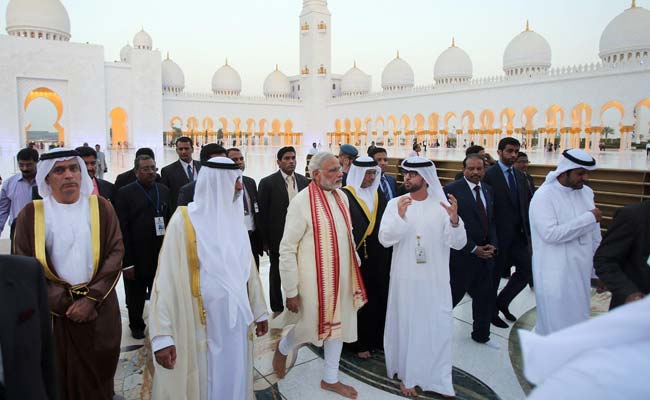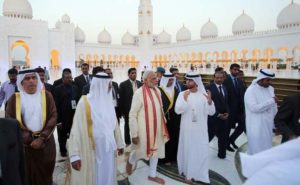India-UAE bilateral relations: towards strategic partnership
Sudanshu Tripathi
As West Asia is an extended part of Greater Asia and UAE is an important core member of this region just as India is in East Asia, both countries need to explore and consolidate the roots of their social and cultural ties coming down today since ages. Indeed, both India and United Arab Emirates (UAE) enjoy strong bonds of close friendship having a legacy of age-old cultural, religious and economic relations which certainly require a new thrust in the present era of eastward shifting global geo-politics. In fact, several new developments have compelled the UAE and other West Asian nations to follow “look east” policy where India continues to be a traditionally favorable destination for them due to its proclaimed commitment towards eternal values like world peace, solidarity, non-violence, non-alignment and also being a prominent founder member of the Non-aligned movement. Among these developments are the mounting Islamic State terror in the region and the world, crumbling regional security architecture supported by the US, declining oil revenues of oil-producing countries in the region and rising Chinese presence in the region based upon its brute military force, etc., as worth mentioning. In fact, the rising Chinese imperialist-militarist assertions and aggressions not only in Asia-pacific over South China Sea but in the entire Indo-Pacific along with its revival of Grand Silk Road Strategy have aroused suspicions about its “Middle Kingdom” complex and that, perhaps, pushes forward the Gulf monarchies like Saudi Arabia, Oman, etc. to seek friendly relations with India. On its part, India too is pursuing it “Look West” policy towards the Gulf for its energy security and other geo-strategic goals, besides maintaining close, cordial relations with Iran.
Although the relationship between India and UAE flourished after coming into power of H.H. Sheikh Zayed Bin Sultan Al Nahyan as the Ruler of Abu Dhabi in 1966 and subsequently with the creation of the UAE Federation in 1971, but no Indian prime minister could visit the country following three decades, the last one only in 1981 by the then Prime Minister Indira Gandhi. Their mutual relations received a fresh impetus particularly after Indian Prime Minister Narendra Modi’s visit to the UAE in August 2015 followed by Sheikh Mohammad Bin Zayed’s- the Crown Prince of Abu Dhabi and Deputy Supreme Commander of the UAE Armed Forces- visit in February 2016. Thus “Indo-UAE relations have become much closer and stronger, and this can only become better in coming years,” said Yousuf Ali, Chairman of Lulu Group and Board member of Abu Dhabi Chamber. Similarly Indian Charge d’ Affaires at the Indian Embassy in Abu Dhabi, Neeta Bhushan also holds that Indo-UAE relations have become much closer and stronger with these reciprocal visits. During this visit of the Indian Prime Minister both sides agreed to upgrade their bilateral relations to a new comprehensive strategic partnership. Since then, both sides are pursuing sincerely to improve their overall relations.
As UAE and India share age-old cultural ties which have been further strengthened by their regular cultural exchanges, they are carrying it both at official and people-to-people levels. The Cultural Agreement of 1975 between them provides the basic framework for cooperation to bring Arab and Indian cultures together. The two countries also agreed to form a Joint Working Group for cooperative research on subjects of mutual interest, exchange and training of scientific personnel, exchange of technologies and data, organization of workshops and seminars, and transfer of know-how and equipment on a non-commercial basis, just to consolidate their traditional friendship.
It is in this context the already commenced visit of His Highness Sheikh Mohammad Bin Zayed Al Nahyan to India to grace the country’s Republic Day as the chief guest has aroused a remarkable euphoria and celebrations in New Delhi which are being visualized as another sign of the consolidating bi-lateral relations between the two nations. Obviously, the Modi government is keen on pushing forward the strategic nature of bilateral relations between these two traditional friends, particularly in the context of ongoing turmoil and insecurity caused by ISIS and also because the new American President Donald Trump is at loggerheads with China over South China Sea and Taiwan, as they make sincere efforts to forge an overarching and deepening engagement which is being described as a strategic government-to-government partnership reaching out to people at large. But the continuing tensions between China and the US as well as Beijing’s close links with Iran may trouble the Gulf countries. Also the uncertainty over policies that President Trump may pursue to deliver on his campaign promise to tackle China may weigh on the Gulf monarchies’ interactions with China.
Foreign policy and economy
Ever since the creation of the UAE Federation in 1971, trade relation between these two friends has played a major role in giving momentum to their close ties. At the heart of its foreign policy, the UAE is very much interested in extending bridges of cooperation and friendship with India. In fact, the UAE’s foreign policy, since being laid by the late founding father, Sheikh Zayed bin Sultan Al Nahyan, has been attaching paramount importance to these ties, which rose a new height when Sheikh Zayed paid a historic visit to India in 1975 and had talks with the then Indian Prime Minister, Indira Gandhi, the Indian President and senior statesmen. Today, President His Highness Sheikh Khalifa bin Zayed Al Nahyan is not only pursuing the same path as Sheikh Zayed, but has also added further vibrancy, momentum, and strength to these relations. In the overall realignment of the country’s foreign policy goals, India attaches considerable importance to the relations with UAE on its coordinated strategy in international relations spreading over economic, political, security and strategic interests. Sheikh Mohammad’s visit comes at a time when the Indian economy is opening up more sectors to foreign investments. Since Indian economy is recovering strongly as International Monetary Fund (IMF) said in its annual projection of the “World Economic Outlook (WEO), forecasting its growth for the current and next year 7.6 per cent the past fiscal and next, up from 7.4 per cent estimated in July for both the years. Last year the World Bank said that India’s GDP could grow 7.6 per cent in 2016-17 and 7.7 per cent in 2017.” According to January 2015 figures, the total foreign direct investment (FDI) from the UAE to India was estimated to be $3.01 billion. During Modi’s visit, the two sides had agreed to establish an UAE-India Infrastructure Investment Fund, setting an ambitious target of $75 billion to support investment in India’s infrastructure. Both sides have set up a task force to nudge investments under this fund. The growing warmth in their mutual relations has set expectations rising among the business community.
UAE as third largest trading partner of India
The UAE and India are making tremendous efforts to push their economic investment and trade cooperation to new heights. As per forecasts, India is expected to rise as the world’s third largest economy by 2030 after the United States and China. “The UAE was the third key trade partner to India after China and the US in 2013 and 2014.The two-way trade has seen meteoric growth over the years, rising from US$43.5 billion in 2009 to nearly US$60 billion in 2014 from just US$180 million in 1971. The UAE-India bilateral trade continued to grow in strength with Indian exports of goods and commodities expected to surge to US$100 billion and two-way trade exchange to US$160 billion by 2030”, making the UAE the largest trade partner of India in the world. According to a study by the UAE Ministry of Economy, “India is the number one trade partner of the UAE with a relative share of 9.8% of the total UAE non-oil trade. It also ranked first in the UAE’s overall exports with a relative share of 14.9% and ranked second in the UAE’s re-exports to the world accounting for 8.7% of the UAE’s total re-exports. India also ranked third in the UAE’s total imports with a relative share of 9.2%.” The UAE is the largest Arab investor in India, accounting for 81.2% of total Arab investments in India, and is ranked 11th in the world regarding foreign direct investments in India. The total UAE investments in India amounted to US$8 billion, including US$2.89 billion in the form of direct foreign investments. “The value of investments by Indian companies in the UAE is estimated at more than US$55bn, according to statistics by the Indian Business and Professional Council.” The UAE also hosts the largest Indian community overseas, with more than 2.6 million Indians living and working in the UAE.
Security and counter-terrorism
As regards peace and security of the region, the UAE pays due attention to regional security in Asia and puts India at the forefront of its international partnerships besides broadening an inclusive dialogue with a view to deepening and diversify their mutual engagement. There are particularly strong opportunities for UAE-India security cooperation in combating terrorism against the backdrop of mounting ISIS terror in Syria and Iraq and various other global terror outfits like Taliban in Afghanistan and Jaish-a-Muhammad and Haqqani networks in Pakistan. In recent years, UAE, like Saudi Arabia, have embarked on a closer relationship with India on security and counter-terrorism because the Islamic State is openly calling for the destruction of established monarchies in the region. In any eventuality then, India is at closest proximity to step into any vacuum that arises if the US pulls out of the region to focus on China under its “Rebalance to Asia” policy.
Thus at a time when the UAE desires a trusted strategic partner cum net security provider and also a reliable customer and India needs the uninterrupted supply of reasonably priced crude oil and investments into its territory for economic reasons, which are declining and moving towards the US and Europe, the visit of the Crown Prince of Abu Dhabi will be a welcome change for ensuring growth and welfare of people of both the countries as they lie at the heart of India-UAE relations. Indeed both governments wish to sincerely nurture these relationships not only for ensuring their mutual progress, prosperity, security and stability but also that for the entire extended Asian region and even beyond.


